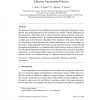Free Online Productivity Tools
i2Speak
i2Symbol
i2OCR
iTex2Img
iWeb2Print
iWeb2Shot
i2Type
iPdf2Split
iPdf2Merge
i2Bopomofo
i2Arabic
i2Style
i2Image
i2PDF
iLatex2Rtf
Sci2ools
131
click to vote
ISCI
2010
2010
Effective vaccination policies
We present a framework for modeling the spread of pathogens throughout a population and generating policies that minimize the impact of those pathogens on the population. This framework is used to study the spread of human viruses between cities via airplane travel. It combines agent-based simulation, mathematical analysis, and an Evolutionary Algorithm (EA) optimizer. The goal of this study is to develop tools that determine the optimal distribution of a vaccine supply in the model. Using plausible benchmark vaccine allocation policies of uniform and proportional distribution, we compared their effectiveness to policies found by the EA. We then designed and tested a new, more effective policy which increased the importance of vaccinating smaller cities that are flown to more often. This “importance factor” was validated using U.S. influenza data from the last four years. Key words: epidemiology, evolutionary algorithm, influenza, migration, vaccination.
Related Content
| Added | 28 Jan 2011 |
| Updated | 28 Jan 2011 |
| Type | Journal |
| Year | 2010 |
| Where | ISCI |
| Authors | L. Shaw, W. Spears, L. Billings, P. Maxim |
Comments (0)

